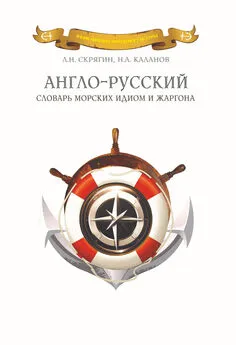Adam Makkai - Словарь американских идиом: 8000 единиц
- Название:Словарь американских идиом: 8000 единиц
- Автор:
- Жанр:
- Издательство:неизвестно
- Год:неизвестен
- ISBN:нет данных
- Рейтинг:
- Избранное:Добавить в избранное
-
Отзывы:
-
Ваша оценка:
Adam Makkai - Словарь американских идиом: 8000 единиц краткое содержание
Это обновленное и дополненное издание, содержащее более 8000 идиоматических
слов и выражений, причем каждое из которых снабжено грамматическим объяснением
и практическим примером. Словарь содержит лексемные идиомы, фразеологические
единицы и поговорки, имеющие особенное значение. В нем приведены наиболее
употребительные выражения только американского английского языка. Этот словарь — идеальное пособие для студентов, часто разъезжающих бизнесменов и просто
путешественников.
Словарь американских идиом: 8000 единиц - читать онлайн бесплатно полную версию (весь текст целиком)
Интервал:
Закладка:
[good]See: AS GOOD AS, AS GOOD AS ONE GETS, BUT GOOD, DO ONE GOOD, FOR GOOD, FOR GOOD MEASURE, GET THE GOODS ON, HOLD GOOD, IN GOOD, IN GOOD FAITH, IN GOOD TIME, IN ONE’S GOOD GRACES, IT’S AN ILL WIND THAT BLOWS NOBODY GOOD, MAKE GOOD, MISS IS AS GOOD AS A MILE, NO GOOD, ON ONE’S GOOD BEHAVIOR, ON ONE’S GOOD SIDE, SO FAR, SO GOOD, STAND IN GOOD STEAD, TO THE GOOD, WELL AND GOOD, WITH GOOD GRACE.
[good and ---] {adv.} , {informal} Very; completely. •/ John’s father was good and mad when John came home late. / •/ Jack knew good and well that Tom had thrown the snowball at him. / •/ I pushed Bill good and hard. / •/ Susan wouldn’t come out till she was good and ready. / •/ I beat Joe good and proper in the game of marbles. /
[good as]See: AS GOOD AS.
[good as one’s promise]See: AS GOOD AS ONE’S WORD.
[good as one’s word]See: AS GOOD AS ONE’S WORD.
[good buddy] {n.} , {slang} , {citizen’s hand radio jargon} Salutation used by truckers and automobile drivers who have CB radios. •/ What’s the Smokey situation, good buddy? /
[good command]See: HAVE A GOOD COMMAND OF.
[good day] {interj.} Hello or goodbye. — Used as a formal greeting or salute when you meet or leave someone during the day. •/ Miss Rogers said, "Good day!" when she met her friend on the street. / •/ Mr. Lee said "Good day!" and left the office. /
[good deal]or [great deal] {n.} , {informal} A large amount; much. — Used with "a". •/ Mrs. Walker’s long illness cost her a good deal. / •/ George spends a great deal of his time watching television. / — Often used like an adverb. •/ Cleaning up after the party took a great deal more work than the girls expected. / •/ Usually it takes Father half an hour to drive to work, but in bad weather it takes a good deal longer. / •/ Mother likes the gloves Mary gave her, and she uses them a good deal. / •/ George is a good deal like his father; they both love to eat. / Syn.: A LOT, QUITE A LITTLE. Compare: ALL KINDS OF, GOOD MANY. Contrast: A LITTLE.
[good egg] {slang} or {informal} [good scout] {n. phr.} A friendly, kind or good-natured person, a nice fellow. •/ Tommy is such a good egg that everybody wants to be his friend. / Syn.: REGULAR GUY. Contrast: BAD EGG.
[good evening] {interj.} Hello or goodbye. — Used as a formal greeting or salute when you meet or leave someone in the evening. •/ When the TV program began, an announcer appeared and said, "Good evening, everyone." / •/ Finally Aunt May stood up and said, "I will not sell the house. Good evening, Mr. Flynn. " /
[good faith] {n.} 1. Belief in another person’s honesty; trust. •/ Uncle Dick let me have the keys to his candy store to show his good faith. / — Often used in the phrase "in good faith". •/ The teacher accepted Bob’s excuse for being late in good faith. / 2. Honesty of purpose; trustworthiness. •/ John agreed to buy Ted’s bicycle for $20, and he paid him $5 right away to show his good faith. /
[good for]or [hurrah for] {adj. phr.} Used with a name or pronoun to praise someone. •/ Good for George! He won the 100-yard dash. / •/ You got 100 on the test? Hurrah for you. /
[good-for-nothing] {adj. phr.} Worthless. •/ While Janice works hard each day, her good-for-nothing husband hangs around in the bars. /
[good grief!] {interj.} , {informal} Wow! Indication of surprise, good or bad. •/ "Good grief," Joe cried out loud. "Is this all you will pay me for my hard work?" / •/ What a figure Melanie has, good grief! I wonder if she would be willing to go out with me. / Compare: GOODNESS GRACIOUS!, HEAVENLY DAYS!, HOLY CATS or HOLY COW or HOLY MACKEREL or HOLY MOSES. See: GOODNIGHT(2).
[good head on one’s shoulders] {n. phr.} Good sense; good judgment. •/ Jack has a good head on his shoulders; he never drives too fast. / •/ Alice is a girl with a good head on her shoulders, she always keeps good company. / •/ George showed he had a good head on his shoulders by refusing to cheat. /
[good many]or [great many] {n.} or {adj.} A large number (of); very many. Used with "a". •/ We found some fall flowers, but the frost had already killed a good many. / •/ A great many of the houses were knocked down by the earthquake. / •/ Tom has a good many friends at school. / •/ Mary has a great many ideas for interesting programs. / Syn.: QUITE A FEW. Compare: A LOT, ANY NUMBER, GOOD DEAL. Contrast: A FEW.
[good nature] {n.} Readiness to please others and to be pleased. Cheerfulness, pleasantness. •/ Everybody likes Mr. Crowe because of his good nature. / •/ Miss Reynolds was remembered by her students for her good nature. /
[goodness]See: HONEST-TO-GOODNESS, MY GOD or MY GOODNESS.
[goodness gracious] {interj.} , {slightly archaic} Exclamation of surprise and a certain degree of disapproval. •/ "Can my boyfriend stay overnight, Dad?" Melanie asked. "Goodness gracious, most certainly not!" her father replied. "What would the neighbors think?" /
[goodness knows]See: GOD KNOWS.
[good night] {interj.} 1. Used as a polite phrase when you leave someone at night. •/ "Good night!" said Bob as he left Dick’s house after the party. "I’ll see you in the morning." / •/ Bill said good night to his parents and went upstairs to bed. / 2. or [good grief] — Used to show surprise and often some fear or anger. •/ Mr. Johnson’s eyes opened wide when he saw the fish his little boy had caught, and said, "Good night!" / •/ Mother was angry and said to Mary, "Good grief! Haven’t you started the dishes yet?" /
[good riddance] {n.} A loss that you are glad about. Often used as an exclamation, and in the sentence "good riddance to bad rubbish". To show that you are glad that something or somebody has been taken or sent away. •/ The boys thought it was good riddance when the troublemaker was sent home. / •/ When Mr. Roberts' old car was stolen he thought it was good riddance. / •/ Betty thought it was good riddance when her little brother broke his toy drum. / •/ "I’m going and won’t come back," said John. "Good riddance to bad rubbish!" said Mary. /
[goods]See: DELIVER THE GOODS, CONSUMER GOODS.
[good show!] {adj. phr.} Excellent; terrific; wonderful. •/ "Good show, boys!" the coach cried, when our team won the game. /
[good scout]See: GOOD EGG.
[go off] {v.} 1. To leave; to depart. •/ Helen’s mother told her not to go off without telling her. / 2a. To be fired; explode. •/ The firecracker went off and scared Jack’s dog. / 2b. To begin to ring or buzz. •/ The alarm clock went off at six o’clock and woke Father. / 3. To happen. •/ The party went off without any trouble. / •/ The parade went off without rain. /
[go off half-cocked]also [go off at half cock] {v. phr.} , {informal} To act or speak before getting ready; to do something too soon. •/ Bill often goes off half cocked. / •/ Mr. Jones was thinking about quilting his job, but his wife told him not to go at half cock. /
[go off like clockwork]See: GO LIKE CLOCKWORK.
[go off the deep end]or [go overboard] {v. phr.} , {informal} To act excitedly and without careful thinking. •/ John has gone off the deep end about owning a motorcycle. / •/ Mike warned his roommate not to go off the deep end and get married. / •/ Some girls go overboard for handsome movie and television actors. /
[goof off] {v.} , {slang} To loaf or be lazy; not want to work or be serious; fool around. •/ Tow didn’t get promoted because he goofed off all the time and never did his homework. / •/ If you goof off on the job too much, you’ll be fired. /
[go off in a huff] {v. phr.} To depart in anger. •/ Marian went off in a huff just because Jeff failed to open the door for her. /
[go on] {v.} 1a. To continue; not stop. •/ After he was hit by the ball, Billy quit pitching and went home, but the game went on. / •/ The TV picture began to jump, and it went on like that until Father turned a knob. / •/ I asked Jane a question but she went on reading and didn’t answer. / •/ Mother told Jim to stop, but he went on hitting Susan. / Syn.: KEEP ON. 1b. To continue after a pause; begin with the next thing. •/ "Go on! I’m listening," said Mother. / •/ The teacher pointed to the map, and went on, "But the land that Columbus came to was not India." / — Often used before an infinitive. •/ Father said Mother had gone to the hospital, and went on to say that Grandmother was coming to take care of us. / 1c. (Of time:) To pass. •/ As time went on, Mary began to wonder if John had forgotten their date. / •/ The years went on, and Betty’s classmates became gray-haired men and women. / 2. To happen. •/ Mr. Scott heard the noise and went to see what was going on in the hall. / •/ The teacher knows what goes on when she leaves the room. / Syn.: TAKE PLACE. 3. To talk for too long, often angrily. •/ We thought Jane would never finish going on about the amount of homework she had. / 4. To fit on; be able to be worn. •/ My little brother’s coat wouldn’t go on me. It was too small. / 5. Stop trying to fool me; I don’t believe you. — Used as a command, sometimes with "with". •/ When Father told Mother she was the prettiest girl in the world. Mother just said, "Oh, go on, Charles." / •/ "Aunt May, your picture is in the paper." "Go on with you, boy!" /
[go on record] {v. phr.} To make an official statement as opposed to an informal one; say something officially that may be quoted with the person’s name added for reference. •/ I want to go on record that I oppose the merger with the firm of Catwallender and Swartvik. /
[go on the rocks]See: ON THE ROCKS.
[go one’s way] {v. phr.} 1. To start again or continue to where you are going. •/ The milkman left the milk and went his way. / •/ The man stopped and asked me for a match, then went his way. / Compare: GO ALONG, GO ON. 2. To go or act the way you want to or usually do. •/ Joe just wants to go his way and mind his own business. / •/ Don’t tell me how to do my job. You go your way and I’ll go mine. / •/ George was not a good sport; when the game did not go his way, he became angry and quit. /
Читать дальшеИнтервал:
Закладка:







